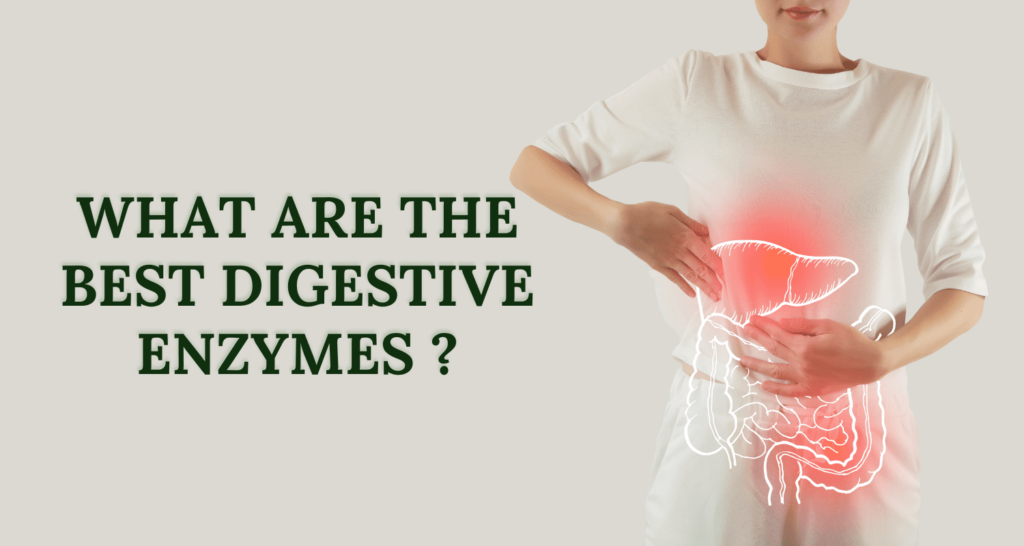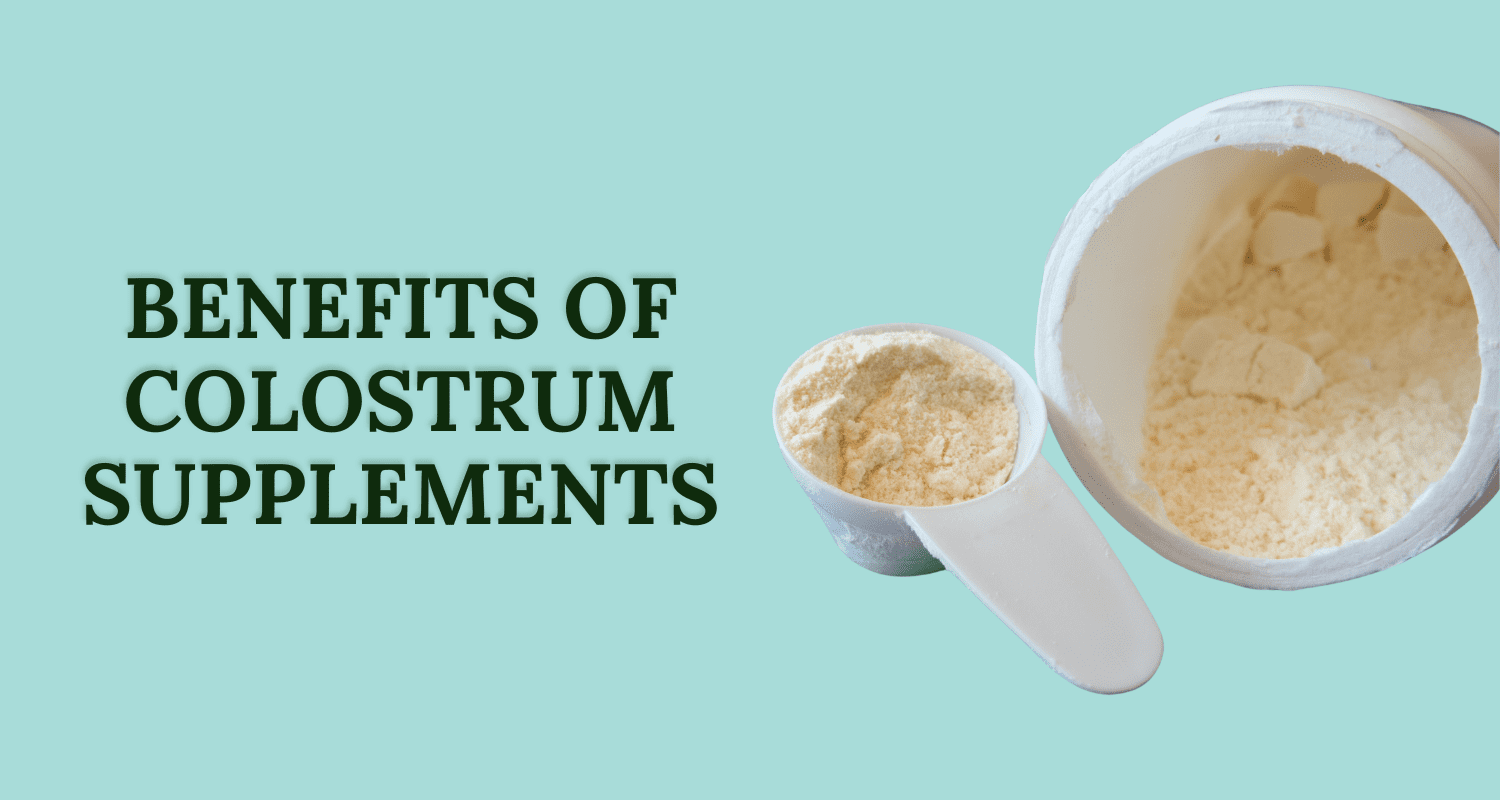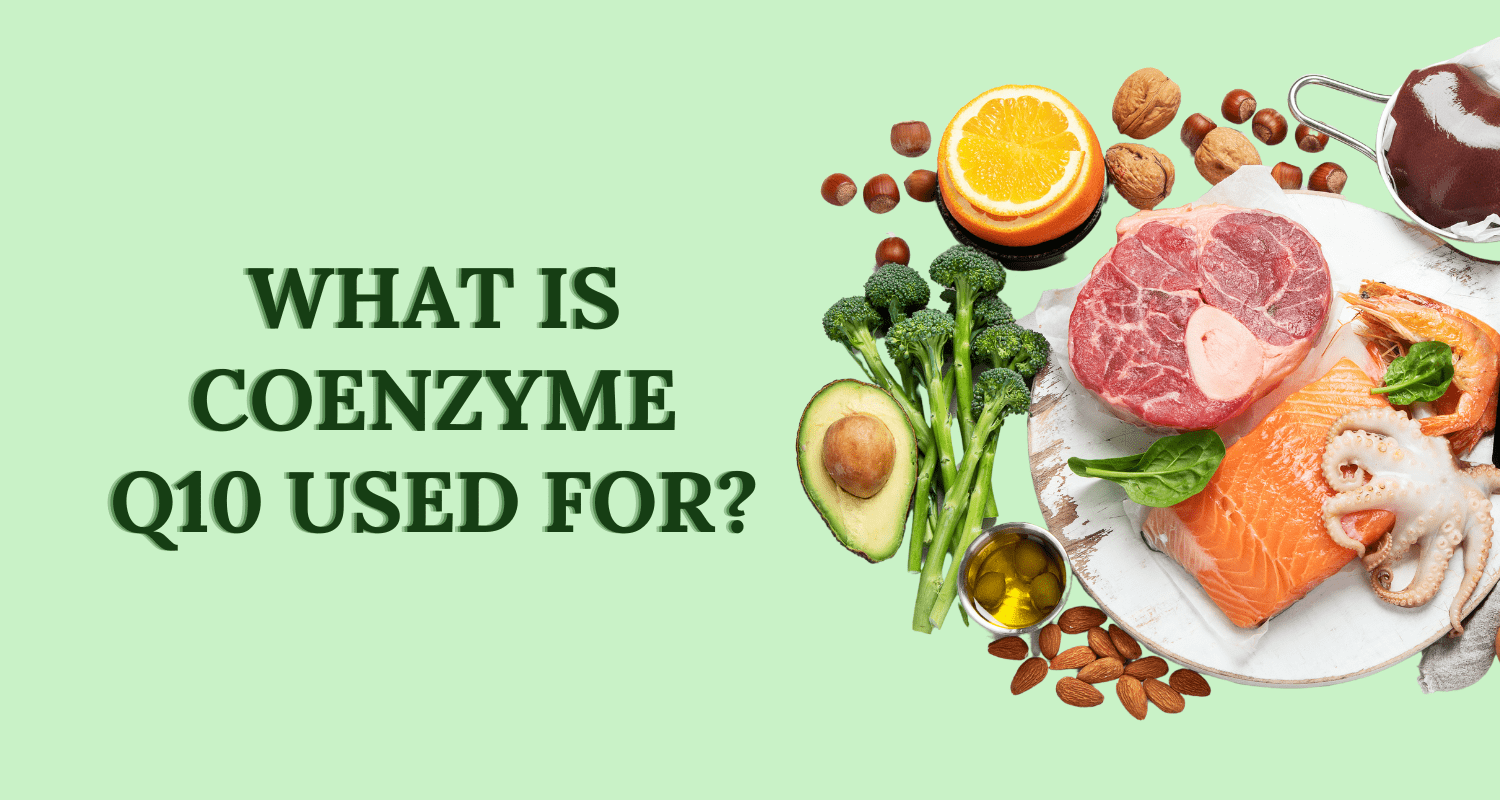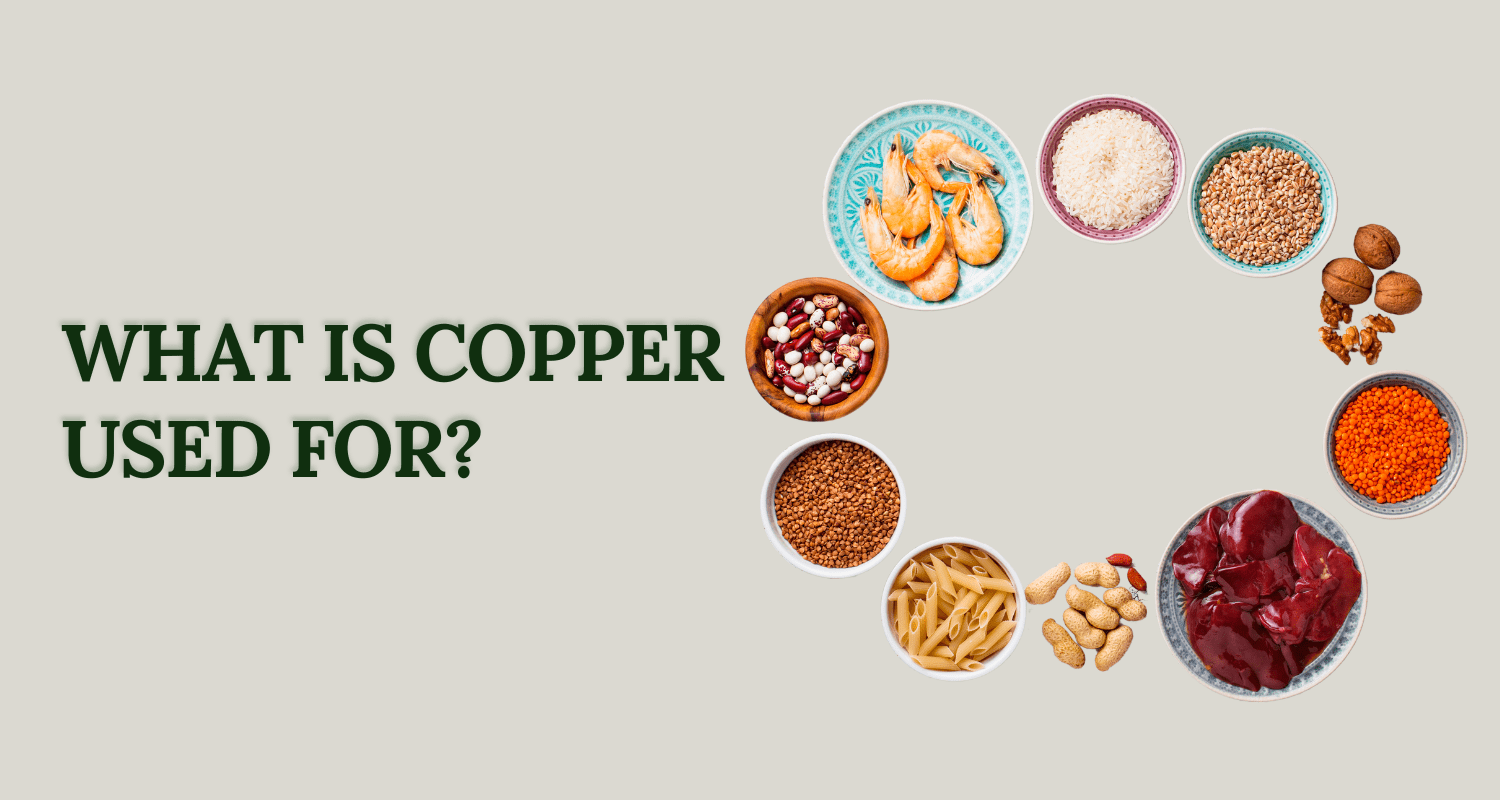Did you know that digestive enzymes are like natural proteins in our bodies?
They help break down food so that we can get important nutrients. But, some people might not have enough of these enzymes. This can cause digestive troubles and make them feel uncomfortable.
If you face such issues, digestive enzyme supplements might offer a solution. They can boost your digestion and ease problems like bloating, gas, and diarrhea. This, in turn, helps maintain a healthy gut.
These supplements come in many forms, from wide-ranging mixes to those specific for certain diets. Because each person’s digestive system is different, choosing the right kind of digestive enzymes is key. It’s smart to talk with a healthcare expert first before you start taking any of these supplements into your diet.
Let’s delve into what are the best digestive enzymes.
Key Takeaways
- Digestive enzymes are naturally occurring proteins that aid in digestion and nutrient absorption.
- Digestive enzyme supplements can help improve digestion and alleviate symptoms like bloating, gas, and diarrhea.
- What are the best digestive enzymes? There are various types of digestive enzyme supplements available, including broad-spectrum blends and specific enzyme formulas.
- It is important to select digestive enzymes based on individual requirements and consult with a healthcare professional before adding any supplements to the diet.
- Digestive enzymes are an important component of optimal gut health.
What are Digestive Enzymes and How Do They Work?
Digestive enzymes are key proteins made by our bodies. They break down food so our bodies can use it. For example, they help digest carbs, fats, and proteins into forms our body can absorb.
What are the best digestive enzymes? There are different types of digestive enzymes, each working on a specific nutrient. Amylase handles carbs, turning them into sugars for quick energy.
Lipase focuses on fats, changing them into fatty acids our body can use. Finally, protease breaks down proteins into amino acids, vital for our health.
Lactase is crucial for those who find dairy hard to digest. It breaks down lactose, the sugar in dairy products. This enzyme is a game-changer for people with lactose intolerance.
These enzymes work at different points in digestion. Amylase starts breaking down food in the mouth and keeps going in the stomach. Lipase and protease perform their jobs mainly in the small intestine. This is where the nutrients from food are absorbed into our body.
Overall, digestive enzymes play a big part in how our bodies take in nutrients from food. They help turn food into energy, supporting a healthy lifestyle.
Digestive Enzyme Insufficiency: Causes and Symptoms
When the body lacks enough digestive enzymes or can’t use them properly, digestive enzyme insufficiency happens. This problem makes it hard to break down foods and get the nutrients from them. There are different types of this issue, like congenital sucrase-isomaltase deficiency, exocrine pancreatic insufficiency, and lactose intolerance.
Congenital sucrase-isomaltase deficiency means your body doesn’t have the enzyme to digest certain sugars. It can lead to trouble digesting foods with these sugars.
Exocrine pancreatic insufficiency is when the pancreas doesn’t make enough enzymes for carbs, proteins, and fats. This causes problems in digesting and using vital nutrients.
Lactose intolerance is another type where the body lacks lactase, the enzyme for breaking down milk sugars. Those with this issue may feel sick after eating dairy.
The signs of this problem include stomach pain, bloating, diarrhea, gas, oily stools, and losing weight without a cause. If you have these signs a lot, see a doctor. It could be something bad for your health.
Digestive Enzymes vs. Probiotics: Understanding the Difference
Many people get confused about digestive enzymes and probiotics. Both are crucial for gut health but serve different roles. Digestive enzymes break down food into simple forms our body can use. Probiotics, however, are live organisms that support a healthy gut balance.
Digestive enzymes work by making food easier for the body to absorb. They tackle carbs, fats, and proteins, helping us get the nutrients we need. Probiotics are live microorganisms that also live in our gut. They maintain a healthy digestive system and boost good bacteria growth.
The Role of Probiotics in Digestion
Probiotics are key for breaking down food more. They add extra enzymes to our digestion process. This helps not just with food but also strengthens our immune system.
You can find probiotics in certain foods, like yogurt and sauerkraut. Yet, sometimes, taking probiotic supplements is the best way to improve your gut.
The Gut Microbiome and Digestion
Our gut has trillions of bacteria that help us. They digest food, make vitamins, and support the immune system. This community of bacteria is called the gut microbiome.
But, this balance can be upset, leading to health issues. Probiotics are useful for fixing this balance.
The Importance of Maintaining a Healthy Balance
It’s critical to keep both digestive enzymes and probiotics in balance for good digestion. Digestive enzymes turn food into nutrients we can use. Probiotics keep our gut full of healthy bacteria. They work together for our gut health.
Eating varied foods and adding probiotic-rich food or supplements to your diet helps. Also, reducing stress and avoiding too many processed foods is good for your gut.
In short, both digestive enzymes and probiotics are vital for our health. They work together to ensure we digest food well and stay healthy. A balanced approach with the right foods and maybe some supplements can really make a difference.
Conditions That Can Cause Digestive Enzyme Insufficiency
Many illnesses and treatments can make our bodies lack digestive enzymes. This leads to problems digesting food and not absorbing nutrients well. Some people might be born with these issues, while others develop them because of certain illnesses or treatments.
Here’s a look at what causes this problem:
Genetic Enzyme Insufficiencies
- Genetic issues or changes in our genes can stop us from making enough digestive enzymes. These are very important for digesting food.
- For people with these genetic issues, managing their condition is lifelong. This helps them digest food and absorb nutrients better.
Exocrine Pancreatic Insufficiency
- Exocrine pancreatic insufficiency means the pancreas doesn’t make enough enzymes to digest carbs, fats, and proteins.
- Chronic pancreatitis, or long-lasting pancreas swelling, can cause this. It stops the pancreas from making enough enzymes.
Cystic Fibrosis
- Cystic fibrosis is a gene problem that affects the pancreas among other body parts.
- People with cystic fibrosis make fewer digestive enzymes. This leads to problems digesting food and not getting enough nutrients.
Gastrointestinal Surgeries
- Surgeries on the digestive system can mess up the pancreas’s job. They may affect how well it makes and releases enzymes.
- Some of these surgeries are pancreatic resection, gastric bypass, or intestinal resection.
Pancreatic Cancer
- Cancer in the pancreas can stop it from making and releasing digestive enzymes.
- Tumors in the pancreas cause swelling. This can mean the pancreas won’t make enough enzymes, leading to problems digesting food.
Anyone with signs of digesting poorly should see a doctor. They can run tests to check what might be wrong. Doctors can offer treatments like special enzyme pills. These help the body digest food better, reducing symptoms and improving overall health.
Prescription Digestive Enzymes vs. Over-the-Counter Digestive Enzymes
Choosing between prescription and over-the-counter digestive enzymes is key for many with enzyme issues. It’s important to know the differences to make the right choice for your health.
Prescription digestive enzymes, like those from a doctor (PERT), have been OK’d by the FDA. Doctors recommend these for people who can’t produce enough enzymes naturally. They help break down carbs, fats, and proteins in food.
These enzymes are great for those with issues like pancreatic problems or cystic fibrosis. For people who can’t get the right enzymes from their bodies, these can be a big help.
Over-the-counter enzymes don’t need a doctor’s note and can be found in stores. They’re often used for things like acid reflux, bloating, and diarrhea. But remember, the FDA doesn’t check them for quality and safety like they do with prescription options.
Always talk to a healthcare pro before using any enzyme supplement. This advice is true for both prescription and over-the-counter varieties. They can help you pick the best one for your digestive needs.
The right choice depends on your unique situation and your doctor’s advice. Prescription enzymes are tailored to specific needs and are closely watched.
On the other hand, over-the-counter options offer more freedom and accessibility. With your doctor’s help, pick the one that is best for you.
Getting Digestive Enzymes from Food
Some people say foods like pineapples or avocados are full of digestive enzymes. But, there’s no clear proof of this. Eating a variety of whole foods helps your body make the enzymes it needs.
To get more enzymes, eat lots of fresh fruits and veggies, lean meats, and whole grains. These foods are packed with nutrients and help enzymes break down food. This supports good digestion and a healthy gut.
Fresh fruits and veggies are great sources of enzymes. Papaya and kiwi, for instance, contain an enzyme that helps digest proteins. Melons, bananas, and mangoes may help with carbs digestion.
Avocados, on the other hand, don’t have many enzymes. But they’re great for your health. They’re full of fiber for healthy bowels and healthy fats that aid in vitamin absorption.
Pineapples aren’t a direct source of digestive enzymes either. But they do have an enzyme called bromelain. This enzyme is known for fighting inflammation and could help with digestion.
Adding enzyme-rich foods to your diet, like fresh fruits and veggies, avocados, and pineapples, can really help. It’s best to eat a wide variety of healthy, unprocessed foods. This keeps your digestive system working well by encouraging enzyme production.
Choosing Over-the-Counter Digestive Enzyme Supplements
Many people turn to over-the-counter digestive enzyme supplements to help with digestion. Finding the right one involves looking at several key points.
Factors to Consider When Choosing Enzymes:
- Specific enzymes: Select products with the right enzymes for your digestive issues. For instance, if dairy bothers you, pick something with lactase.
- Dosage and concentration: Make sure the supplement’s enzyme levels match what you need. This is crucial for seeing benefits.
- Additional ingredients or fillers: Be cautious about any extra ingredients. They might include things you’re sensitive to or have allergies.
- Manufacturer claims: Always check if what the company says is true. Look for evidence that their claims are based on solid science.
It’s important to remember that these digestive enzyme supplements aren’t regulated by the FDA. This can lead to variations in quality and effects. Talking to a doctor or nutritionist before taking these supplements is advised. They can offer insights tailored to your health and recommend the best options for you.
Recommended Digestive Enzyme Supplements for Specific Needs
Supporting good digestion and easing symptoms is key. Many digestive enzyme supplements are available for this. They are made for various dietary needs and intolerances. This means they can help those with different digestive problems.
Garden of Life Dr. Formulated Digestive Enzymes Organic Digest+
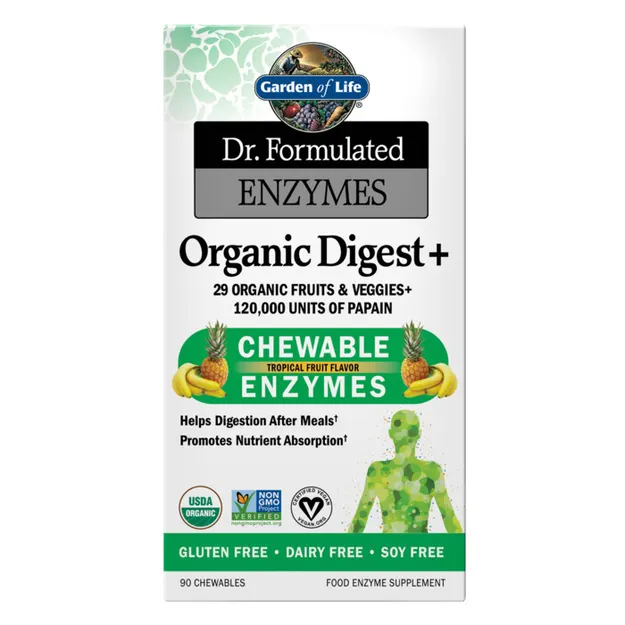
Price: $25-$30 for a 90-count bottle
Benefits:
- Supports healthy digestion.
- Reduces occasional gas, bloating, and indigestion.
- Helps break down proteins, carbs, fats, and fiber.
Features:
- Certified USDA organic and non-GMO.
- Contains 29 powdered organic fruits and vegetables.
- Includes a broad spectrum of digestive enzymes.
Pros
- Vegan, gluten-free, and dairy-free.
- Suitable for various dietary preferences.
- Convenient once-daily capsule.
Cons
- Higher price point compared to some other brands.
- Large capsule size may be difficult for some to swallow.
NOW Super Enzymes
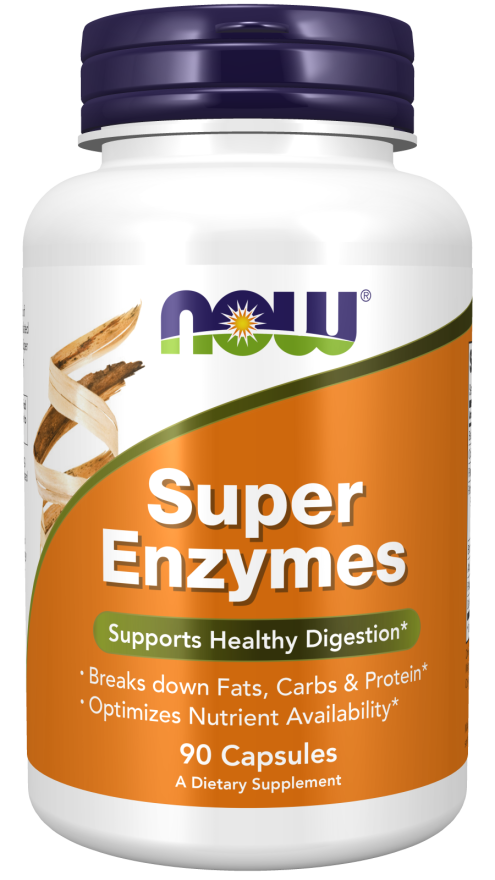
Price: $17-$22 for a 90-count bottle
Benefits:
- Promotes optimal digestion.
- Enhances nutrient absorption.
- Reduces occasional bloating and gas.
Features:
- The comprehensive blend of enzymes.
- Supports the breakdown of fats, proteins, and carbohydrates.
- Contains Betaine HCl for added digestive support.
Pros
- Affordable and high-quality.
- Suitable for people with various digestive issues.
- Trusted brand with consistent product quality.
Cons
- Contains animal-derived ingredients (not suitable for vegetarians/vegans).
- May not be suitable for those with certain food allergies (e.g., papaya, pineapple).
Enzymedica Digest Gold with ATPro
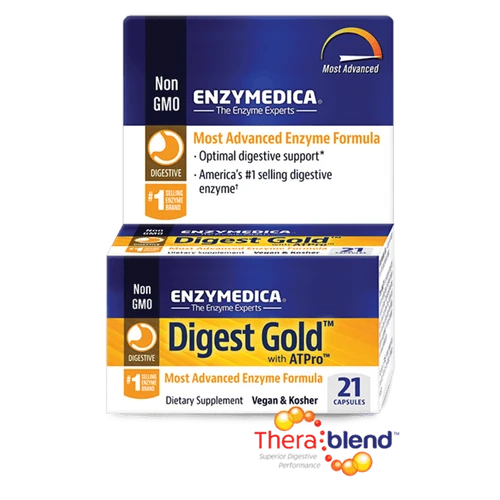
Price: $24-$30 for a 45-count bottle
Benefits:
- Provides high-potency enzyme support.
- Reduces gas, bloating, and indigestion.
- Enhances nutrient absorption.
Features:
- Contains ATPro for improved energy production and enzyme function.
- High activity of digestive enzymes per capsule.
- Non-GMO, vegan, and kosher.
Pros
- Potent formula for those with significant digestive issues.
- Free from common allergens (dairy, gluten, soy).
- Advanced delivery system for enhanced effectiveness.
Cons
- Higher price point for a smaller quantity.
- May be too strong for individuals with mild digestive discomfort.
Zenwise Health Digestive Enzymes with Prebiotics & Probiotics
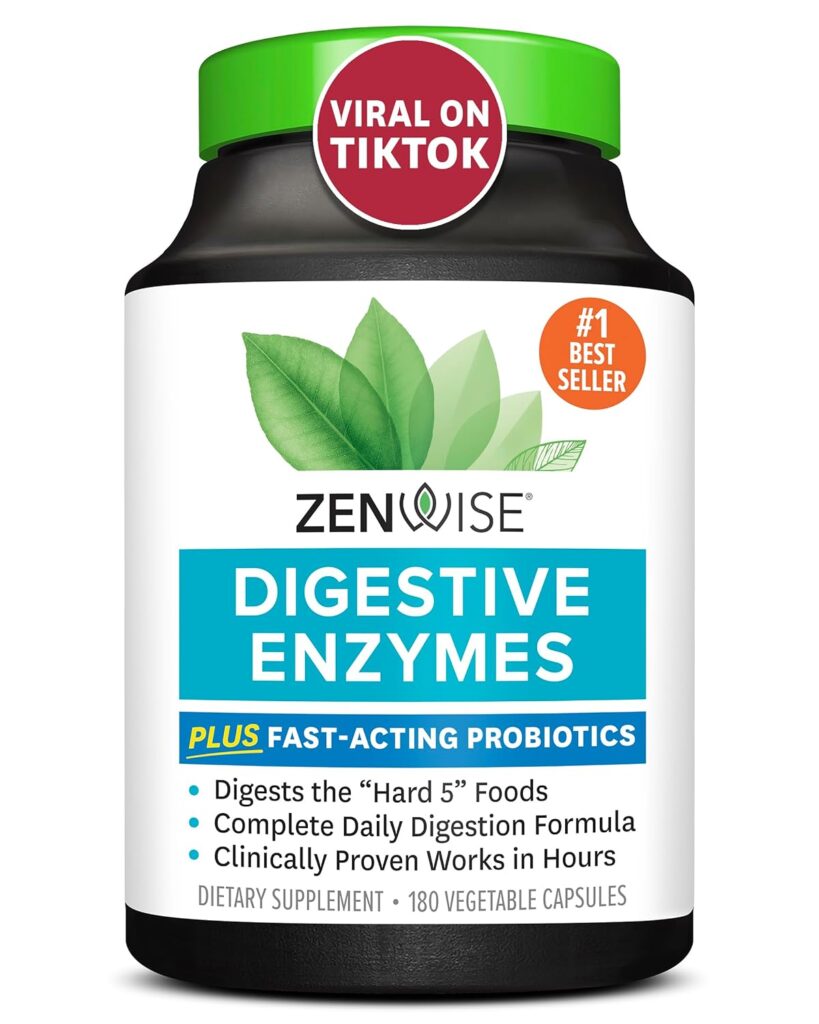
Price: $16-$20 for a 60-count bottle
Benefits:
- Supports overall digestive health.
- Reduces gas, bloating, and discomfort.
- Promotes a healthy balance of gut flora.
Features:
- Includes prebiotics and probiotics for added digestive support.
- Comprehensive blend of digestive enzymes.
- Non-GMO and free from common allergens.
Pros
- Combines enzymes, prebiotics, and probiotics for comprehensive support.
- Suitable for vegetarians.
- Excellent value with a large quantity per bottle.
Cons
- Some individuals may experience initial digestive discomfort due to probiotics.
- Capsules may be too large for some to swallow.
If you need a specific enzyme or want to know more what are the best digestive enzymes, talk to a doctor. They can recommend the best one for you. Finding the right supplement is important. It should match your needs and help you digest better.
Conclusion
What are the best digestive enzymes? Picking the best digestive enzymes depends on your needs. For those lacking digestive enzymes or with special diets, these supplements can help. Yet, before you start them, talking to a doctor is a must. This ensures they fit your personal health plan well.
Your doctor will look at your symptoms, your diet, and your gut health. They will figure out the right enzymes for you. Getting the correct type and amount matters a lot. This makes sure the enzymes work well for you.
While you can easily find these supplements in stores, you need to be careful. They are not checked by the FDA. So, make sure to research them before buying. Also, eating a healthy diet helps your body make its own digestive enzymes.
Caring for your gut can really help you feel better and can boost your health. So, start by talking to your doctor about digestive enzymes. They can help you find what’s best for you.
FAQs
What are the best digestive enzymes?
For general digestion, look for a blend including protease, amylase, and lipase.
What is the best type of digestive enzyme to take?
The best type varies depending on your specific needs, but broad-spectrum enzymes covering proteins, carbohydrates, and fats are generally recommended.
What are the 3 most important digestive enzymes?
Protease breaks down proteins, amylase tackles carbohydrates, and lipase targets fats.
Which enzyme is best for the stomach?
Pepsin is a key enzyme for breaking down proteins in the acidic environment of the stomach.
What are the 4 main types of digestive enzymes?
Proteases, amylases, lipases, and cellulases are the main types, each targeting different food components.
Who should avoid digestive enzymes?
Individuals with certain medical conditions, such as pancreatitis or allergies to enzyme sources, should consult a healthcare provider before using digestive enzymes.
Which is better enzymes or probiotics?
Both play vital roles in digestion and gut health. Enzymes help break down food, while probiotics promote a healthy balance of gut bacteria. The best approach often involves using both for optimal digestive support.
Disclaimer: This content, including advice, provides generic information only. It is not a substitute for a qualified medical opinion. Always consult a specialist or your doctor for more information. Nutrition Cult does not claim responsibility for this information.

